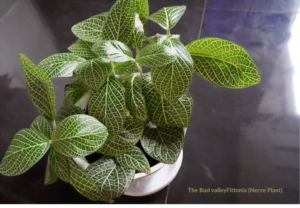A long time ago, in 2017, I bought my first Fittonia (Nerve Plant) to keep in my house because I was instantly drawn to its beauty. At that time, I had no idea how to care for it. Now, I have 25 Fittonia plants in my house, and they have truly enhanced the aesthetics of my home. Today, I’ll share my personal experience on how to care for this plant in this blog, providing you with a comprehensive guide. By following these tips, you’ll gain a complete understanding of this plant and easily identify it.
Fittonia (Nerve Plant) typically grows between 3 to 6 inches tall and spreads 12 to 18 inches. Although it rarely flowers, it may occasionally bloom with tiny red or yellow-white spikes.
Plant Attributes
Common Name |
Fittonia, painted net leaf, mosaic plant, and nerve plant |
Botanical Name |
Fittonia aliveness |
Family |
Acanthaceae |
Plant Type |
Perennial |
Mature Size |
3-6 in. Tall,c12-18 in. spread |
Sun Exposure |
Partial |
Soil Type |
Moist but well-drained |
Bloom Time |
Summer |
Flower Color |
White, Red |
Native Area |
South America |
Hardiness Zones |
11 (USDA) |
Soil pH |
Acidic |
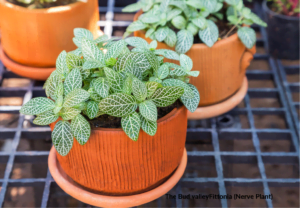
Taking care of this tree is very important because if it is not properly maintained, it will not live long, and you will not be able to enjoy its beauty as you hope. The most important aspects to consider for this plant are sunlight, watering, removing unwanted branches or dead leaves, avoiding overwatering, and keeping the plant at a certain temperature. Each topic must be reviewed properly. Now, I will mention each aspect step by step so that you get a complete understanding and can take proper care of this tree. I will share my personal experience, having cared for this tree since 2017, so the information I provide will be reliable. I am 100% sure to present accurate information and will reveal tips from my personal experience.
Light

Currently, no plant or tree can live long without sunlight, but some plants thrive in direct sunlight while others cannot tolerate it and may have their leaves burn, ultimately leading to the plant’s death. This plant cannot tolerate direct sunlight, so it must receive indirect sunlight. In the room where you keep this plant, try to place it near a north-facing window to ensure it gets indirect sunlight. Direct sunlight can burn the leaves and cause the plant to die. From my personal experience, sunlight is very important for this plant. When I first planted this tree, I exposed it to direct sunlight for just one day, and its leaves burned. I am 100% sure that this plant cannot tolerate direct sunlight.
Soil
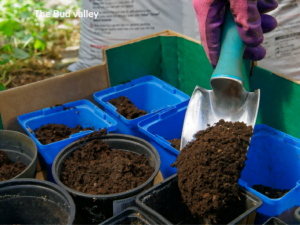
Soil is very important for a plant, as about 80 to 90% of the food and nutrients a plant gets comes from its soil. When selecting soil, one must keep in mind that this plant grows well in standard potting soil. Slightly acidic soil with a pH of around 6.5 is much preferred.
Water
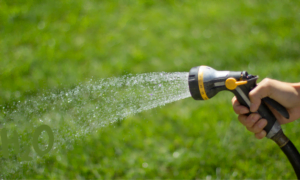
There are some issues regarding the use of water for this plant. It must be watered in a certain way; excess water cannot be provided, and it cannot be left without water for a long time. Let’s discuss how to properly water this plant. Water only on certain occasions, such as whenever the soil becomes dry to the top one inch. Another thing to keep in mind is not to overwater, as overwatering can cause root rot, damaging the plant. In my opinion, you should notice when the soil at the base of the plant is about 70% dry and water the plant as soon as it is dry so that it will grow normally.
We all know that watering plants should be reduced in winter because the roots rot more during winter. Therefore, the amount of water should be reduced during this season.
Temperature

The temperature must be taken care of because high temperatures are never good for the Fittonia (Nerve Plant). This plant can tolerate temperatures from 40 to 60°F. Above 70°F, this plant will not do well. Keeping the temperature between 50 and 60°F is ideal for the plant. These plants prefer rainforest-like humid conditions, and regular misting can help keep them from drying out in dry climates. Using a humidifier during the dry winter months is also beneficial.
Fertilizing

Fertilizing the plants is a very good practice, but it’s important to avoid giving excess fertilizer. It’s crucial to fertilize the plant at the right time so that Fittonia (Nerve Plant) can grow normally. I recommend giving this plant a weak dose of liquid fertilizer weekly, using a balanced 5-5-5 fertilizer mixed at half strength. By fertilizing in this way, you can protect your plants very well, and they will grow very nicely.
Pruning
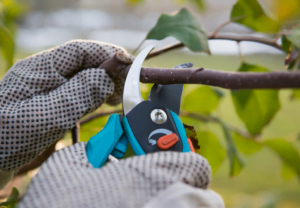
Pruning is required for the plant to grow healthily, but you should never prune healthy branches or leaves because this plant grows quickly and needs dead leaves and branches to grow properly and receive all the nutrition it needs.
Common problems and solutions for maintaining Fittonia
Addressing common problems like leaf drop, yellowing, or pests quickly can help prevent further damage and keep your fittonia thriving.
The Physical Benefits of Fittonia
Air purification properties of Fittonia

If you keep this plant in your house or room, it will help clean the pollutants and polluted air, giving you a pleasant atmosphere.
Stress-relief benefits of having Fittonia indoors

Having fittonia plants around can help reduce stress levels and increase coolness, which is considered ideal for creating a calming environment in your home or office. This has been my experience, and they are indeed more beautiful.
Healing properties associated with Fittonia
Fittonia has been linked to a number of therapeutic benefits because it is a big contributor to bettering general health and respiratory function.
The Mental Benefits of Fittonia
Boosting mood and reducing anxiety with Fittonia
Just as the natural environment generally cheers up the human mind, keeping this plant in your home or room can make a difference in your home and room environment. This can improve your health and reduce feelings of anxiety.
Cognitive benefits of having Fittonia in your environment
Interactions with the Fittonia plant have been shown to enhance cognitive function and memory, providing mental stimulation that can improve brain health.
Improving concentration and focus through interaction with Fittonia
Having Fittonia around you can help improve your focus and concentration, aiding productivity and performance in various tasks.
I hope from the above discussion you now have all the detailed information about the Fittonia (Nerve Plant), how to care for it, and how to get the best from this plant. From my experience, I am confident that you have benefited from this blog. Thank you.


